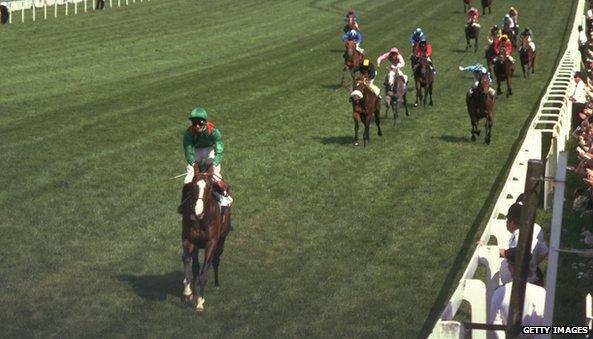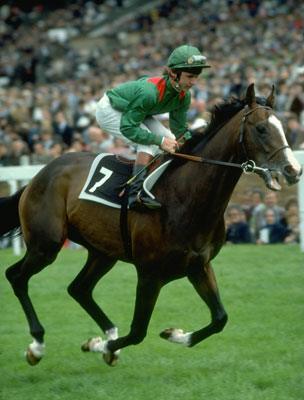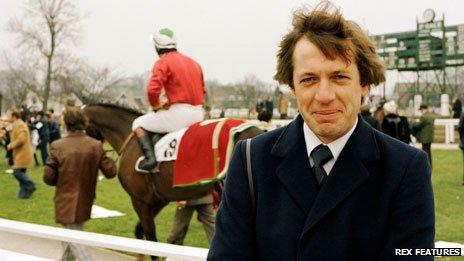Shergar: The day the wonder horse was stolen
- Published

Exactly 30 years ago, kidnappers broke into the Ballymany Stud in the Republic of Ireland and stole the champion racehorse, Shergar. What happened to the animal remains a mystery.
Shergar was the most famous, and most valuable, racehorse in the world. The big bay colt with a distinctive white blaze on its face had won the 1981 Derby by a record 10 lengths. He had followed that triumph with successes in the Irish Derby and the King George and stamped himself as one of the all-time greats.
When he retired at the end of that season, racehorse owners paid a staggering £10m for shares in his services impregnating mares.
But after just one year, fate intervened. Kidnappers armed with handguns broke into the Ballymany Stud - owned, like the horse, by the Aga Khan - and forced the head groom, James FitzGerald, to load Shergar into a trailer. FitzGerald and Shergar were then driven off in separate vehicles while FitzGerald's family were held at gunpoint to ensure silence.
FitzGerald was given a code word to be used in negotiations over a ransom, driven around for three hours and then dumped by the side of the road.

Shergar won six of his eight races
For unfathomable reasons, it would be a further five hours before the police were informed about the crime - two Irish cabinet ministers are reported to have been informed before the police. So eight hours had passed before the search for Shergar began - eight hours during which the 1981 Derby winner could have been driven miles to the north or the south or west.
There had never been a crime like it - the Irish were, and still are, huge horse lovers.
Police began a painstaking search, asking the public to check every stable and barn across the country, as speculation grew over who had been responsible for the abduction.
Suspicion immediately fell on the IRA, then at the height of its powers, and forever in need of cash to buy arms for its paramilitaries. There was speculation in the media of an imminent ransom demand but it was to be more than 24 hours before any news came from the kidnappers.
That Wednesday evening, a call came into the BBC newsroom in Belfast. An anonymous caller said negotiations would only be conducted with three horseracing journalists from London. The three had to be at the Europa hotel the following evening.
The three men chosen to be the intermediaries were Lord Oaksey, a former amateur rider and the racing correspondent for the Daily Telegraph, Peter Campling, a tipster on the Sun, and Derek Thompson who, like Lord Oaksey, worked for ITV's racing team.
Thompson says he got a call at three in the morning, asking if he was willing to go to Belfast. He checked with his bosses at Thames TV and was on board the plane that afternoon along with his two colleagues and a camera crew.
He said the scene that greeted him at Belfast airport was incredible: "It was like being a film star. There were cameras all around." The news of a lead in the search for the equine superstar had spread. About 100 cameramen and journalists were in or outside the Europa Hotel as Thompson and his co-negotiators arrived.
Thompson says he was trying to push his way through the press pack when a voice came from reception: "Mr Thompson, would you pick up the hotel phone?"

Negotiator Derek Thompson tried to help police trace the kidnappers' calls
At the other end of the line was a voice Thompson describes as "cold, chilling". It gave the agreed codeword - "Arkle", the name of a famous Irish steeplechaser - and then warned Thompson, "We are watching you from across the road."
Thompson looked out the window and saw a row of dingy bars with darkened windows. This was Belfast at the height of the Troubles. Any optimism he had about his role had gone.
He took down the instructions he was given - namely to lose the press pack and make his way to an isolated farm 30 miles from Belfast.
The press were lost in true Hollywood style - a dash through the kitchens to a waiting car at the service entrance.
But the journey was even more eventful.
"We were lost," Thompson recalls, "totally lost. It was the middle of Troubles, we were miles outside Belfast, going up a single track road.
"Suddenly, five guys in balaclavas and machine guns appear in front of us. We slam on the brakes and I think, hang on, these guys are just going to spray the car.
"They've got us over not to negotiate the release of the Derby winner, but to kill us.
"Then this guy comes round to my side and he motioned with his machine gun, wind the window down. So I did and I was sitting there, six inches away from a gun pointing straight at me held by a guy with two holes for his eyes and one for his mouth.
"And he said to me: 'Are you Derek Thompson?' I looked at him and said, 'Yes.'"
"And he said 'We're the police.' To which I replied: 'Thank God for that!'"
The police ushered the group into the farmhouse, owned by a breeder and trainer of racehorses, Jeremy Maxwell. Over the course of the next eight hours Thompson took between 10 and 12 more phone calls, each beginning with a different password.
Thompson was trying to keep his interlocutor on the phone for more than 90 seconds, the length of time required for the police to discover the caller's location. The voice knew what Thompson was doing and was putting down the phone after 80 seconds, 85 seconds, never any longer.
Finally, at 01:00 in the morning, Thompson succeeded. A conversation lasted 95 seconds. He turned round to the policeman at his shoulder and said: "Did you get it? Where are they?" Only to be told, "I'm sorry Mr Thompson but the man who traces the calls went off-shift at midnight."
Despite all the talking, they had never managed to get beyond the opening demands - the kidnappers wanted an initial payment of £40,000, while Thompson was asking for a picture of Shergar taken next to that day's newspaper.
For the next six hours they heard nothing. Thompson and the police dozed fitfully. Finally at 06:55 on Thursday morning the phone rang one last time. The caller said just eight words: "The horse has had an accident. He's dead." He then hung up.
The hunt for Shergar continued for weeks but to Thompson it was now a wild goose chase. The police even enlisted the service of two mediums. No-one has ever admitted the theft of Shergar. The body has never been found. The most valuable horse in the world disappeared without trace.
Thompson is convinced he was speaking to the kidnappers. Details have subsequently emerged, which have only strengthened his conviction. A password that he had never revealed was included in a book written by an IRA supergrass, Sean O'Callaghan, who claimed the organisation had planned and committed the theft.
Thompson, now a racing correspondent, believes the account outlined in that book, that IRA gunmen took the horse and within 36 hours had found themselves unable to control such a big, powerful stallion. There was an accident and the horse had to be destroyed.
He also believes the kidnappers took Shergar to the south coast of Ireland and following the accident, dumped his body into the sea. He has no evidence to support that theory, but says it would at least explain the lack of a corpse.
Derek Thompson was speaking to Witness on the BBC World Service. Listen to the programme via iPlayer or browse the Witness podcast archive.